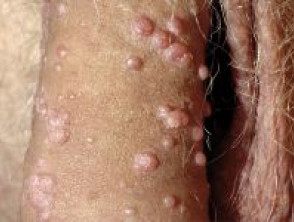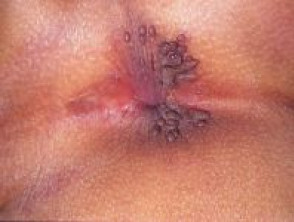

Genital warts also known as venereal warts are small flesh colored bumps/growths on the genital region. They are the most common sexually transmitted infections (STI) in Kenya and worldwide.
Genital warts are caused by certain strains of a virus referred to as the human papilloma virus (HPV).
They normally affect the moist genital and anal areas, as well as the mouth and throat of both males and females. Here are some key points about genital warts:
- Causes:
Genital warts are primarily caused by HPV, specifically low-risk strains like HPV 6 and 11. These strains can lead to the development of warts on or around the genitals, anus, and in some cases, the throat.
- Transmission:
They are highly contagious and can be transmitted through sexual contact with an infected person. They can be spread through vaginal, anal, or oral sex, as well as through close skin-to-skin contact.
Symptoms:
Genital warts often appear as small, flesh-colored or grey growths or lumps on the genital and anal areas. They can be raised or flat, and they may appear singly or in clusters.
They may be painful or even itchy.
Some individuals with HPV infection may not develop visible warts but can still transmit the virus.
- Complications:
While they are usually non cancerous and not associated with serious health risks, they can cause discomfort, pain, itching, bleeding with intercourse and may be emotionally distressing. Additionally, some strains of HPV, including those that cause genital warts, are associated with an increased risk of certain cancers, including cervical cancer.
- Diagnosis:
These growths are typically diagnosed through a visual examination by a healthcare provider. In some cases, a biopsy or other tests may be necessary to confirm the diagnosis or assess the extent of the infection.
- Treatment:
There is no cure for HPV, but genital warts can be treated. Treatment options especially in Nairobi Kenya include topical medications, cryotherapy (freezing the warts), laser therapy, or surgical removal. It’s always important to consult a healthcare provider in case you are worried of having these growths. You can book an online consultation with us at https://hellodaktari.co.ke for appropriate advice and treatment. Self-treatment can lead to complications.
- Risk factors:
Who is more at risk of acquiring genital warts?
- People who engage in unprotected sexual intercourse with multiple sexual partners.
- Individuals who start engaging in sexual intercourse at an early age.
- Individuals with a reduced immunity probably due to conditions like diabetes, cancer, HIV/AIDS etc.
PREVENTION:
- The most effective way to prevent genital warts and HPV infection is through vaccination. HPV vaccine is recommended for both males and females, typically starting during adolescence.
- Condom use can also reduce the risk of transmission, although it may not provide complete protection, as HPV can infect areas not covered by a condom.
- Regular Check-ups:
Routine check-ups with a healthcare provider, especially for sexually active individuals, can help detect and manage genital warts and HPV-related issues early.
It’s essential to practice safe sex, get vaccinated if eligible, and communicate openly with sexual partners to reduce the risk of this infection and other STIs. If you suspect you have genital warts or have concerns about HPV, reach out to us by booking an appointment on our website https://hellodaktari.co.ke whereby we shall be able to give you the right medical advice as well as treatment through an online consultation. We also do offer Home based care services.

Dating is a truly joyful experience. Sometimes we lose sight of this truth in our search for the right Online dating site